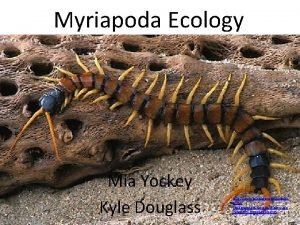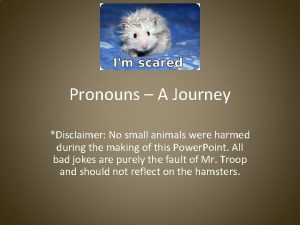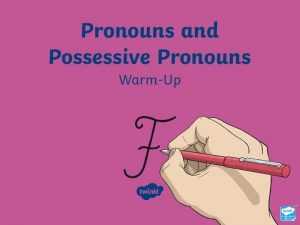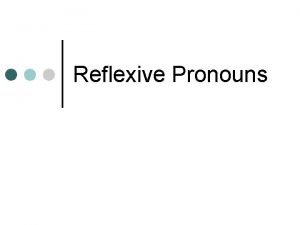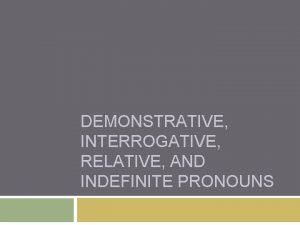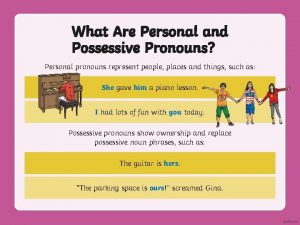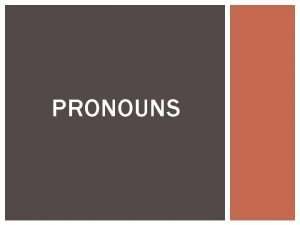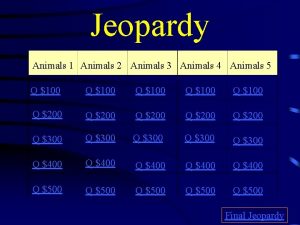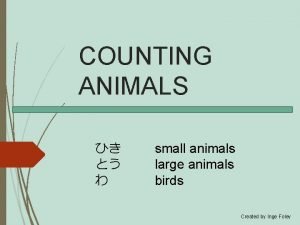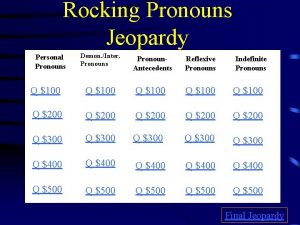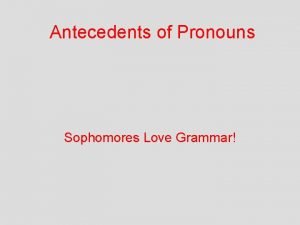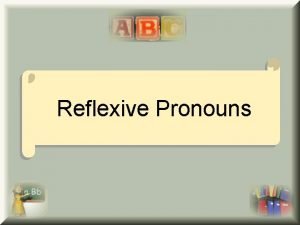Pronouns A Journey Disclaimer No small animals were












- Slides: 12

Pronouns – A Journey *Disclaimer: No small animals were harmed during the making of this Power. Point. All bad jokes are purely the fault of Mr. Troop and should not reflect on the hamsters.

Definition • A pronoun is a word used in the place of a noun. – For example: “The hamster was somewhat afraid. It had never been good at hide and seek. ” • It is a pronoun replacing the word hamster. Therefore the antecedent of “It” is “hamster. ” The antecedent is the word a pronoun replaces.

Me, me, me… Personal Pronouns • A personal pronoun replaces a person or thing. • These may be first person “I, me, we, or us. ” • Second person “you. ” • Or third person “he, she, her, him, it, they, or them. ” – Ex. “I prefer to let you do the driving because she tends to aim for the squirrels. ”

Possessive Pronouns • Possessive pronouns show ownership. • Many people confuse possessive pronouns with contractions, but these are not the same. • For example, “its” is a possessive pronoun showing ownership. However, “it’s” is a contraction meaning “it is. ” • *No possessive pronoun requires an apostrophe. Mine!

Be careful! ? • If you use a possessive pronoun in front of a noun to describe it, now it is no longer acting like a pronoun. It is now acting as an adjective. • Ex. “My hamster prefers techno over classic disco. ” In this sentence “my” is describing whose hamster it is and is no longer replacing a noun. It would now be considered an adjective.

Demonstrative Pronouns • Demonstrative pronouns are those that identify something or point something out. – Ex. “That is not how you spell hamster. There is no p in hamster, unless you squeeze really hard. ” Oops, sorry about the mess.

Interrogative Pronouns • Interrogative pronouns are those used to ask questions. – Ex. “Who added a motor to the hamster’s wheel? It’s exhausted!” Hmm, a V 8… What is your theory, Sherlock?

Indefinite Pronouns • Indefinite pronouns refer to something unspecified, rather than replacing a noun and having an antecedent. – Ex. Everybody who is somebody will be at the Grand Hamster Ball! I shall save everyone! Well, after I get down and boogie.

Advanced Pronouns • Reflexive pronouns are those that refer to self. – Ex. “The hamster preferred to live by itself. ” I will defend myself!

More Advanced Pronouns • Relative Pronouns are used to connect a dependent clause to an independent clause, or a sentence. – Ex. The hamster was terribly afraid that its cage was too close to the kitchen for comfort. Did they just say, “Let’s cook, hamster, ” or was it, “Let’s cook hamster!”

Review Personal Possessive Demonstrative Interrogative Don’t just hang around. Copy these! Indefinite

Don’t forget the advanced… Reflexive Relative Finally, if your hamster sleeps like this, let him rest…
 Https://a-z-animals.com/
Https://a-z-animals.com/ Animals that eat both plants and animals
Animals that eat both plants and animals Detritus food chain
Detritus food chain Animals that eat both plants and animals
Animals that eat both plants and animals Possessive pronouns for animals
Possessive pronouns for animals Oh may all who come behind us find us faithful
Oh may all who come behind us find us faithful Pilgrims on the journey of the narrow road
Pilgrims on the journey of the narrow road Personal and possessive pronouns
Personal and possessive pronouns Possessive pronouns interrogative
Possessive pronouns interrogative Object pronouns and reflexive pronouns
Object pronouns and reflexive pronouns Demonstrative pronouns vs relative pronouns
Demonstrative pronouns vs relative pronouns Interrogative adjective
Interrogative adjective What is personal pronoun and possessive pronouns
What is personal pronoun and possessive pronouns
